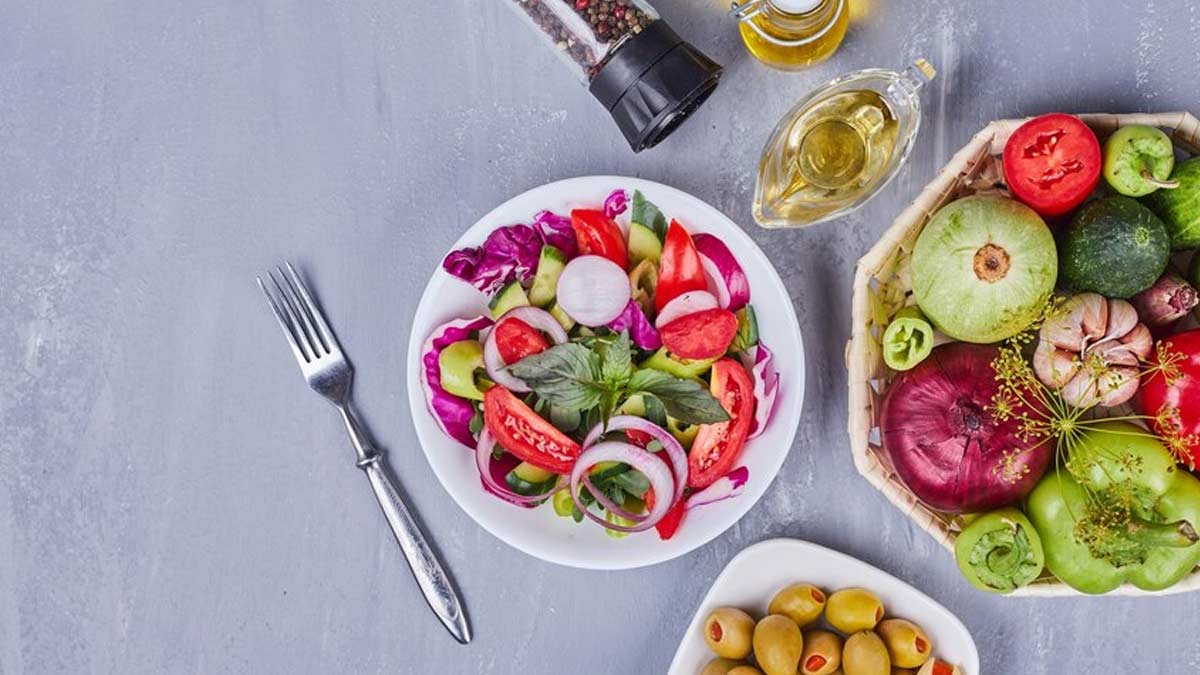
Salads are no longer a snacking option. They have become a go-to meal choice for busy professionals and a heart-healthy alternative for those battling pre-existing medical conditions.
They are not only easy to prepare, which makes them convenient for anyone, but they can also be versatile, packed with nutritious ingredients that can benefit heart health. Read on to find out all about these additional elements that can not only enhance salad taste but also increase its nutritional value.
Table of Content:-
Also Read: Consuming Salad On An Empty Stomach: Expert Explains What Happens To Your Body When You Eat One Bowl
Greens Are A Must

According to the American Heart Association (AHA), choosing dark, leafy vegetables like romaine, spinach, or arugula can benefit the heart in many ways.
A 2021 study published in the European Journal of Epidemiology followed over 53,000 people for 23 years and found that people who ate more vegetables with nitrates had lower blood pressure. These include green leafy vegetables such as spinach and lettuce, as well as fennel, rocket, radishes, Chinese cabbage, and parsley.
Interestingly, the risk of heart disease started to go down even at a moderate vegetable intake of around one cup per day. In fact, it was linked to a 15% lower risk of heart disease and a lower risk of heart attack, heart failure, stroke, and leg circulation problems.
Add Some Protein
If you thought adding some vegetables to your salad was enough, then you probably need to reconsider, as you might also require some amount of protein to increase satiety and improve energy levels in the body.
The AHA recommends adding "grilled skinless poultry or fish with omega-3 fatty acids, such as salmon, trout, and herring. Mix in a chopped hard-boiled egg or a small amount of cheese (choose low-fat, low-sodium cheeses such as mozzarella or Swiss). Toss in a can of chickpeas, kidney, navy, or black beans (choose low-sodium or no-salt-added varieties and rinse and drain them well). Unsalted nuts, such as pecans, almonds, and walnuts, give your salad extra crunch and a dose of healthy fat. All these protein foods will keep you feeling fuller longer."
Whole Grains To Go

Do not forget that you also need fibre, which can be fulfilled not only through vegetable intake but also with whole grains like barley, quinoa, bulgur, sorghum, or wild rice. These also provide vitamins, minerals, and other nutrients, which help control cholesterol levels, weight, and blood pressure, according to the Mayo Clinic.
Herbs For Health
When it comes to salads, they can often turn out bland. Therefore, to enhance taste and texture, you can incorporate various herbs, such as basil, thyme, oregano, or mint. These are rich in antioxidants that help neutralise free radicals, which are known to damage cells and DNA, potentially lowering your risk of heart disease.
Some particularly heart-healthy herbs include garlic, turmeric, ginger, and rosemary. These can help improve blood flow, reduce inflammation, and even lower cholesterol levels.
Nuts And Seeds

Once you are done preparing your salad, you can always top it up with some nuts and seeds that can add an extra punch of nutrition and flavour. Research suggests that eating about 15 grams of nuts and seeds daily reduces the risk of heart disease by around 20% compared to those who consume little to no amount of nuts and seeds, reports the Heart Foundation, adding that eating 3–4 small handfuls of nuts and seeds each week also suffices.
Olive Oil
As far as salads are concerned, their preparation is incomplete without the dressings and the vinaigrettes. One of the basic ingredients needed to prepare them is olive oil, which, according to a meta-analysis published in the Critical Reviews in Food Science and Nutrition, helps reduce inflammation and increase High-Density Lipoprotein (HDL) or 'good' cholesterol, both of which are necessary for heart health.
Conclusion
Salads are the go-to for anyone looking to lead a heart-healthy lifestyle. However, it is important to include all the ingredients listed above in moderate quantities. Remember, a balanced diet is crucial, and overeating may do as much harm as eating unhealthy foods.
Also watch this video
How we keep this article up to date:
We work with experts and keep a close eye on the latest in health and wellness. Whenever there is a new research or helpful information, we update our articles with accurate and useful advice.
Current Version
